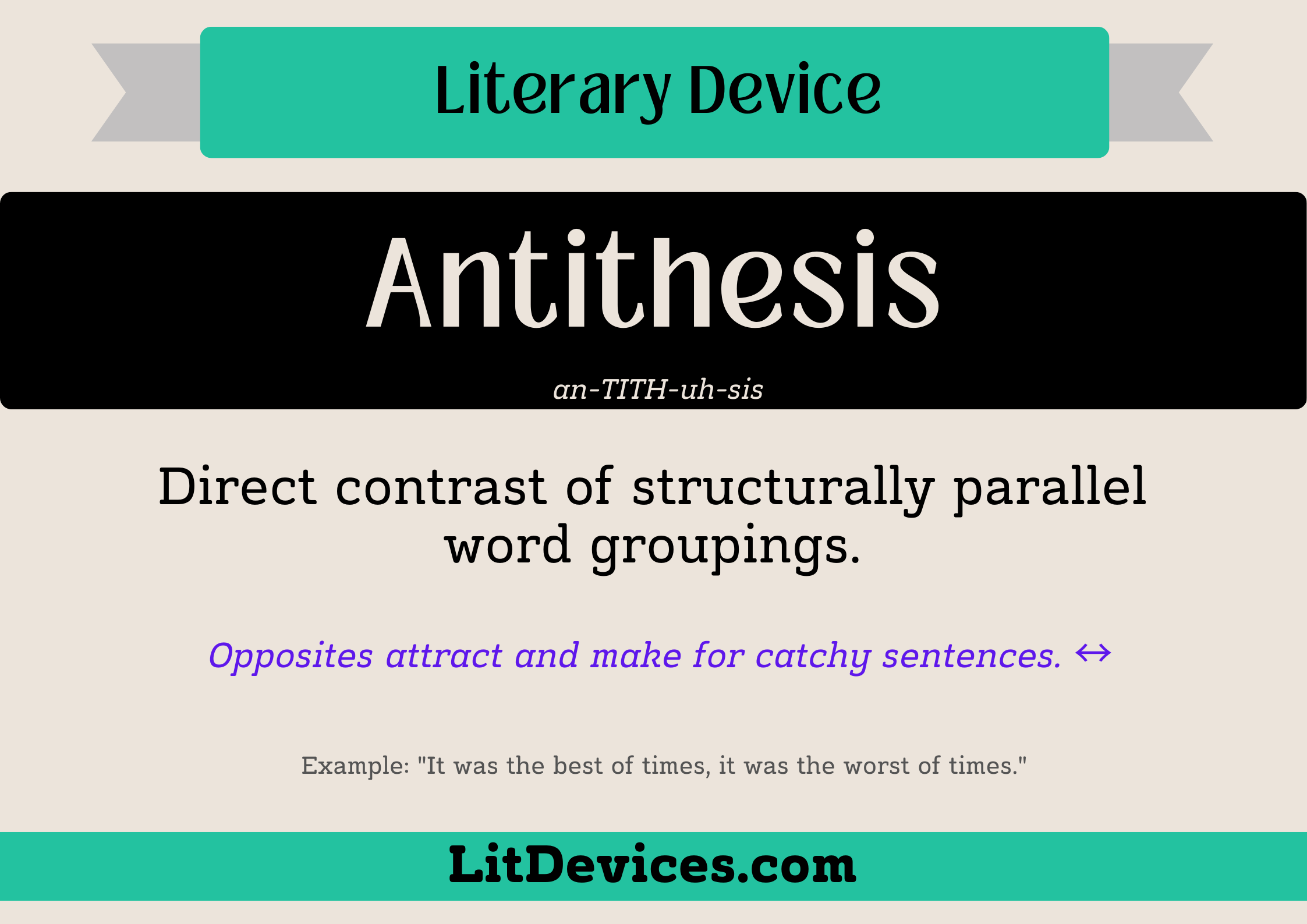What is Antithesis?
From the Greek antitithena, meaning “to oppose” or set opposite.” Antithesis is a powerful writing tool that sets two opposing or contrasting works, phrases, or ideas against each other. It juxtaposes two contrasting ideas against each other in what is commonly referred to as a parallel sentence. An example of what this means is, “Go big or go home.” Note how in this common example, two contrasting ideas are set in opposition creating a balanced, rhythmic sentence. And if in doubt, always remember that its name may be intimidating but, antithesis is a remarkably easy tool to master.
How to pronounce Antithesis?
When do writers use Antithesis?
Writers use Antithesis to make their writing more memorable by creating rhythmic structure. The juxtapositions of opposing ideas also make writing more believable or authoritative. Antithesis is a rhetorical device that allows writers to create a rhetorical effect and elicit an emotional response in readers.
But remember:
Use antithesis to create contrast. Ideally, you want to use opposites to create contrast. However, you will find that you can often get away with contrasting “implied” opposites.
Use antithesis to create parallel structure as in the example, “Go big or go home.” Parallel structure creates
The 3 Golden Rules
- Focus on Contrast.
- Read your writing out loud.
- Use antithesis sparingly (unless you’re Robert Frost and kind of a poetic genius).
Antithesis in Literature 📚
Literature is ripe with examples of antithesis. Two of its most famous kings will always be William Shakespeare and William Blake. Please note the examples below:
- “To be, or not to be: that is the question” – William Shakespeare, Hamlet
- “It was the best of times, it was the worst of times” – Charles Dickens, A Tale of Two Cities
- “Better to reign in Hell, then serve in Heav’n” – John Milton, Paradise Lost
- “Fair is foul, and foul is fair” – William Shakespeare, Macbeth
- “The path of excess leads to the palace of wisdom” – William Blake, The Marriage of Heaven and Hell
Antithesis in Children Literature 🧸
- “The more you give, the more you get” – Dr. Seuss, The Cat in the Hat
- “Where the sidewalk ends, the grass begins” – Shel Silverstein, “Where the Sidewalk Ends”
- “The more things change, the more they stay the same” – Antoine de Saint-Exupéry, The Little Prince
Antithesis in Songs 🎧
“You say yes, I say no” (But really the entire song) – The Beatles, “Hello, Goodbye”
Antithesis in Poetry ✍🏽
Always a personal favorite of those who favor antithesis, Robert Frost, “Fire and Ice”
Some say the world will end in fire,
Some say in ice.
From what I’ve tasted of desire
I hold with those who favor fire.
But if it had to perish twice,
I think I know enough of hate
To say that for destruction ice
Is also great
And would suffice.
“Good we must love, and must hate ill,” – John Donne, “Community”
“To err is human, to forgive divine” – Alexander Pope “An Essay on Criticism”
Antithesis in Movie Dialogue🎥
- The Dark Knight (2008): “You either die a hero or you live long enough to see yourself become the villain.”
- The Lion King (1994): “Oh yes, the past can hurt. But you can either run from it or learn from it”
- The Shawshank Redemption (1994): “Get busy living or get busy dying”
- Forrest Gump (1994): “Stupid is as stupid does”
Antithesis Throughout History
- “Patience is bitter, but it has a sweet fruit.” – Aristotle
- “Folks who have no vices have very few virtues.” – Abraham Lincoln
- “We must learn to live together as brothers or perish together as fools.” – Martin Luther King, Jr.
- “Unlike short-sighted, egocentric humans, God ‘sees with equal eye’ the fall of a hero and a sparrow, the destruction of an atom or a solar system.” – Alexander Pope
Often Mistaken for … 👥
Juxtaposition – The act or instance of placing two things side-by-side. This does not mean opposites or in contrast or even in comparison. It simply means placing them next to each other, “juxtaposed.” Example: Night, day; light, dark; good, evil; or holiday, break. Note that in these examples, the words are placed next to each other with no other information. That is juxtaposition.
Oxymoron – A figure of speech that combines words with opposite meaning into new words with a new meaning. Example: virtual + reality = “virtual reality”.
FAQ 🤔
What is antithesis in literature?
Antithesis is a literary device that juxtaposes opposing or contrasting ideas within a parallel grammatical structure. This contrast of ideas is used to highlight differences, emphasize a point, or create a stark distinction between two concepts, enhancing the text’s rhetorical effect.
How does antithesis enhance a text?
Antithesis enhances a text by creating a clear contrast that can make arguments more persuasive and memorable. It emphasizes the difference between two ideas, making the message more striking and engaging for the reader. The parallel structure often used with antithesis also adds a rhythmic and balanced quality to the writing.
Can antithesis be found in both poetry and prose?
Why do speakers and writers use antithesis?
Speakers and writers use antithesis to clarify complex ideas by contrasting them with their opposites, making the distinctions clearer to the audience. This device is effective in persuasion, as the stark comparison between opposing ideas can influence readers’ or listeners’ opinions and emotions, making the message more impactful.
How can I identify antithesis in a text?
To identify antithesis, look for sentences or phrases where two opposing ideas are presented in a parallel manner, often within the same sentence or in adjacent sentences. This device is characterized by a clear and contrasting relationship between the ideas, emphasized by similar grammatical structures.

